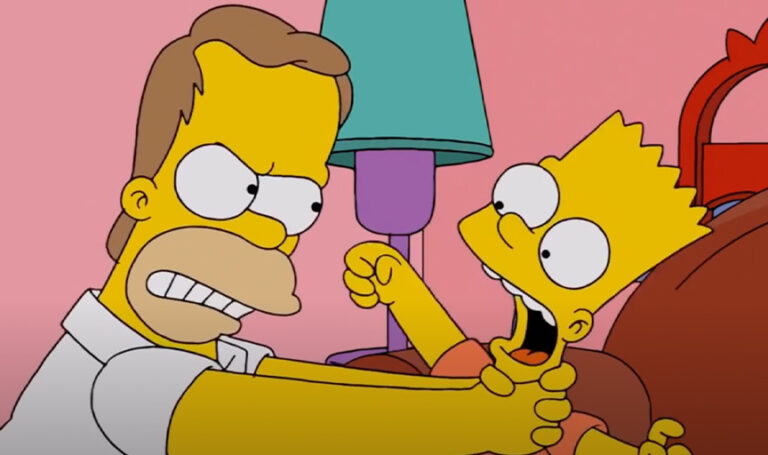Here’s why Homer is not going to strangle Bart in The Simpsons anymore

It’s official, The Simpsons has quietly slipped into a new era. In a move that could be seen as either a nod to modern sensibilities or a grave injustice to classic comedy, the iconic trope of Homer Simpson strangling his son, Bart, has been retired. Yes, you read that right, a classic bit of animated familial ‘bonding’ that has been a mainstay of the show for over three decades is no more. And as you might have already guessed, it’s ruffled quite a few fans’ feathers.
In this age of ever-changing social norms, it appears the creators of the show have decided to retire a couple of gags to keep up with the times. From now on, new episodes will no longer feature this father-son moment that occurred every time Homer decided to express his displeasure with Bart’s shenanigans. You know the drill: a heartfelt “Why you little…” followed by Homer’s hands wrapping tightly around Bart’s throat.
These scenes were a recurring gag that fans of the show have come to know and love, despite its, let’s say, unconventional parenting style. It was as predictable as Marge’s blue beehive and Lisa’s saxophone solos. But alas, all good things must come to an end, and so, The Simpsons have decided to bid farewell to this enduring, albeit somewhat controversial, piece of comedic history.
In the latest episode, of season 35 titled McMansion and Wife, a new family has graced the evergreen Terrace. One particular clip, which features Homer introducing himself to their new neighbour Thayer, shows the new character seemingly impressed by the strength of Homer’s handshake. He even exclaims: “That’s quite a grip,” to which Homer replies “See Marge, strangling the boy has paid off. Just kidding, I don’t do that anymore. Times have changed.”
This charming family dynamic, including the infamous “strangling” gag, was previously addressed in an episode titled Love is a Many Strangles Thing from season 22. In this episode, therapist Dr. Zander attempts to help Homer recognise the error of his ways when it comes to his peculiar method of disciplining Bart. The towering basketball player Kareem Abdul-Jabbar, a friend of Dr. Zander, even steps in to give Homer a hands-on lesson in what it feels like to be young, small, and terrified. Naturally, he does this by playfully demonstrating what it’s like to be mercilessly strangled several times.
Surprisingly, or not so surprisingly, this traumatic experience doesn’t deter Homer from future “strangling” moments with Bart in subsequent episodes. That is, until now.
The fans’ reactions were a mixed bag, with a significant portion enjoying the new direction the show was taking. Others, however, were less enthusiastic about the change, with one netizen writing “Times have indeed changed. I’m old enough to remember when The Simpsons wasn’t crap!”
Times have indeed changed. I’m old enough to remember when the Simpsons wasn’t crap! https://t.co/7en36SUn0R
— Inc.Monocle (@IncMonocle) November 6, 2023
But, believe it or not, this isn’t the first time The Simpsons has found itself smack in the middle of an online debate. The show has a rich history of stirring up controversy, with a prime example of this revolving around the character Apu Nahasapeemapetilon, the diligent manager of the Kwik-E-Mart.
Here’s the twist, despite Apu’s distinct Indian identity, the character is brought to life by a white actor, Hank Azaria. This particular casting decision didn’t just raise a few eyebrows, it sparked a significant and growing backlash, especially in recent years.
The Simpsons creator, Matt Groening, had quite the response to the criticism in 2018 when he stated: “People love to pretend they’re offended.” Unsurprisingly, his statement didn’t sit well with many. Rather than commenting on the very real issues, he brushed these genuine concerns aside by framing them as mere exaggerations of outrage.
The whole Apu controversy ignited in 2017 after the release of a documentary titled The Problem with Apu. Hari Kondabolu, an actor and comedian originally from India, dared to challenge the character’s marked accent and other South Asian stereotypes. The film delves into experiences involving negative stereotypes, minstrelsy, racial microaggressions, and derogatory slurs targeted at individuals of Indian and South Asian descent.
To address the Apu controversy, the show aired an episode in 2018 where Marge attempted to remove any references that could offend anyone from a children’s book. Lisa, in a moment of profound wisdom, remarks: “Something that started decades ago and was applauded and inoffensive is now politically incorrect.”
Following this, Azaria, during an interview on The Late Night Show, offered to step aside or help transition the character into something “new” and proceeded to say: “The idea that anybody young or old, past or present, was bullied or teased based on the character of Apu, it just really makes me sad.”
Humour should evolve with the times. Our history—from the misrepresentation of Black people in cartoon animation to the misrepresentation of other cultures—shows that it’s crucial to keep up with the changing values and sensibilities. What once made us laugh in the past may now be deeply derogatory and offensive to someone else. The retirement of the iconic strangling bit in The Simpsons is a reminder that even one of the most popular shows can adapt and understand the need for change and greater sensitivity in our ever-evolving world.





